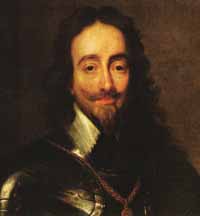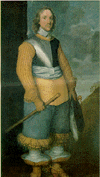The English Civil War: Cavaliers vs. Roundheads

The English Civil War (1995)
It is not possible easily to define the English Civil War. . . As with allhistory, especially the history of dramatic conflict, definition is dependentupon standpoint. From a Marxistperspective the war can be perceived as a locomotive of history, a stagein the bourgeois struggle against the remnants of a feudal monarchy. Froma Whig perspective it looks more like the defeat of a monarchy moving towardsabsolutism and a step towards parliamentary democracy.More recently, revisionists have declared that it was little more than aninconsistent blip in history. They deny that its causes are to be foundin deep-rooted structural deficiencies within state and society. It was,they argue, brought about by lack of trust and irrational prejudices onthe part of the main participants. . . . People living at the time expressedthe same diversity of opinions when they tried to explain what had gonewrong.
Sir Henry Slingsby's Diary (1638-40)
The Scots do mainly stand in defence of the government of their church bythe presbytery, and admit not any of the bishops and therefore do now seekto expell out of the church those whom our king in his time hath established,fearing lest he might by degrees introduce a new form intheir church; and that which make them the more fear it was that now oflate he enjoined them to accept a form of public prayer and administeringsacrament somewhat differing from our book of common prayer, which theyhave refused to accept.
Resistance to ship money payments (1639)
Robert Markes . . . and William Caninge . . . were much abused in the executionof their office by several persons. . . calling them thieves, rogues, assaultingthem, throwing scalding water upon them,. . . and saying that they came.. . to cheat them. . . . The wife of George Platt of Hendon did assaultRobert Markes with a knife drawn and had undoubtedly hurt him had he notrun back. . .
Account of Edinburgh prayer book riots (1639)
Amongst this great multitude there appeared no sign of trouble: but, nosooner was the book opened by the dean of Edinburgh, but a number of themeaner sort. . . with clapping of their hands, cursings, and outcries, raisedsuch a barbarous hubbub in that sacred place, that not any one could eitherhear or be heard. . . .
Sir Simonds D'Ewes's Journal (4 January 1642)
Mr. Pym and the other 4 members of our House who stood accused by his majesty'sattorney of high treason knowing that his majesty was coming to the Houseof Commons did withdraw out of it. . . . After he had ended his speech hewent out of the House in a more discontented and angry passion than he camein. . . . the design was to have taken out of our House by force andviolence the said five members if we had refused to have delivered thempeaceably and willingly. . . . It is very true that the plot was so contrivedas that the king should have withdrawn out of the House. . . before themassacre should have begun upon a watchword by him. . . . [by] those ruffiansbeing about 80 in number. . . being armed. . . with swords and some of themwith pistols.
Charles I (January 1649)
Remember, I am your king, your lawful king and what sins you bring uponyour heads and the
judgment of God upon this land, think well upon it. . . . I would know by what power I am called hither, a king cannot be triedby any superior jurisidiction here on earth. . . .
A king and subject are clear different things.
Act of Parliament (March 1649)
And whereas it is and hath been found by experience, that the officeof a King in this nation
and Ireland, and to have the power thereof in any single person, is unnecessary,burdensome, and dangerous to the liberty, safety, and public interest ofthe people, and that for the most part, use hath been made of the regalpower and prerogative to oppress and impoverish and enslave the subject;and that usually and naturally any one person in such power makes it hisinterest to incroach upon the just freedom and liberty of the people, andto promote the setting up of their own will and power above the laws, thatso they might enslave these kingdoms to their own lust. . . the office ofa King in this nation shall not henceforth reside in or be exercised byany one single person; and that no one person whatsoever shall or may have,or hold the office, style, dignity, power, or authority of King. . .
Oliver Cromwell, Lord Protector of England

Thomas Hobbes, Leviathan (1651)
during the time men live without a common power to keep them all inawe, they are in that condition which is called war; and such a war is ofevery man, against every man. . . In such condition, there is no place forindustry . . . no culture. . . no navigation. . . no commodious building.. . no knowledge of the face of the earth; no account of time; no arts;no letters; no society; and which is worst of all, continual fear, and dangerof violent death; and the life of man, solitary, poor, nasty, brutish, andshort. . . . The final cause, end, or design of men, who naturally loveliberty, and dominion over others, [is] the introduction of that restraintupon themselves, [by] which we see them live in commonwealths. . . . The only way to erect such a common power. . . . is to confer all theirpower and strength upon one man, or upon one assembly of men, that may reduceall their wills, by plurality of voices, unto one will . . . . [All menshall] submit their wills . . . to his will, and their judgments, to hisjudgment. . . . This done, the multitude so united in one person, is calleda COMMONWEALTH.
Bill of Rights (January, 1689)
1. That the pretended power of suspending laws, or the execution oflaws, by regal authority, without consent of parliament is illegal. . .
4. That levying money for or to the use of the crown by pretense of prerogative,without the grant of parliament. . . is illegal. . .
6. That the raising or keeping a standing army within the kingdom in timeof peace, unless it be with consent of parliament, is against the law.
7. That the subjects which are Protestants may have arms for their defense.. . as allowed by law.
13. And that for redress of all grievances, and for the amending, strengthening,and preserving of the laws, parliament ought to be held frequently.
John Locke, Two Treatises of Government (1690)
The reason why men enter into society is the preservation of their property,and the end why they choose and authorize a legislature is that there maybe laws made and rules set as guards and fences to the properties of allthe members of the society. . . whenever the legislators endeavor to takeaway and destroy the property of the people or to reduce them to slaveryunder arbitrary power, they put themselves into a state of war with thepeople. . . By this breach of trust they forfeit the power the people hadput into their hands for quite contrary ends, and it devolves upon the people,who have a right to resume their original liberty and the establishmentof a new legislative (such as they shall think fit), to provide for theirown safety and security, which is the
end for which they are in society. . .


